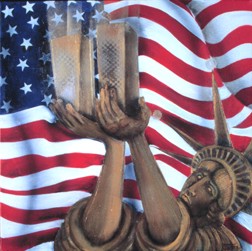| Article Overview:
Friday the 13th is commonly considered a good day for Terrorism.
It's a day of "bad and black luck." But is it? Do we
need a Vigilance Day to counter Terrorism Day? Find out. |
 VigilanceVoice VigilanceVoice

Friday, February 13,
2004—Ground Zero Plus 884
___________________________________________________________
Friday The 13th--A Bad Day For Terrorism
______________________________
 |
_____________________________
by
Cliff McKenzie
Editor, VigilanceVoice.com
|
GROUND ZER0, New York, N.Y.--Feb 13, 2004 -- Terrorism thinks it rules
on this day. Friday the 13th is a day of "evil" for many.
Tens of thousands of phobic people hide in their homes, avoiding
contact with the world in hopes "bad luck" or "misfortune" will not
befall them. People who have a morbid or irrational fear of
Friday the 13th are friggatriskaidekaphobes (on the web -
paraskevidekatriaphobes).
 |
|
Friday the
13th: a day when the world recognizes the presence of the
Beast of Terror |
Even
airlines fear this day and everything to do with the number 13.
There are no 13th aisles in commercial aircraft. And, most
major hotels skip the 13th Floor to avoid clients who are
superstitious and refuse to sleep on a bed of bad luck.
If there is a day when the
world recognizes the presence of the Beast of Terror, it is, Friday
the 13th.
And that's good.
It means that down deep, the
world is aware the Beast is alive, if nothing more than in our
superstitious behavior.
But it goes a lot deeper than
that. Hollywood has turned this day, Friday the 13th, into a day
of blood and guts and horror. Look at the movies
that extol this day. They include a host of cinematic
blood and brutal deaths, validation that the Beast lives in such forms
as Freddy Kruger and Jason.
 |
|
Terrorism
starts in our imagination |
From a
Sentinel of Vigilance viewpoint, we need to realize that Terrorism
starts in our imagination. It gnaws through our resolve, driving
us into states of Fear, Intimidation and Complacency.
It seeks to overshadow Courage, Conviction and Right Actions that
benefit the Children's Children's Children because in most movies
about "monsters," no matter how much they appear to have been killed
or destroyed, the surprise ending leaps out and reminds you that Jason
Lives!
None of us can afford to believe the
Beast rules, but we all can and must believe the Beast exists.
If there is one good thing about Friday the 13th, it is the clarity
that Vigilance can never surrender its power. When
we least expect it, the Terrorism of Fear, Intimidation and
Complacency will leap out at us.
 |
|
Day of
Vigilance: 9-11 |
What we should
have besides the Friday the 13th Day, is a Vigilance Day.
My choice for that day is 9-11, the Day of Vigilance.
Below are listed some myths about
Friday 13th. Some are historical, some are bizarre,
but they all conspire to remind us of our vulnerability to the Beast,
and our need to think 9-11 and Vigilance. If we do, Friday the
13th will be a bad day for Terrorism, not a good one.
|
MYTHS and or HISTORY of Friday the 13th: |
|
One obvious origin of the Friday the 13th myth
is the Bible.
In Douglas E. Winter's book Narrow Houses,
Winter writes about the Last Supper and the 13
gathered around the table.
In John 6: 70-71, "Jesus answered them, 'have not I
chosen you 12, and one of you is a devil?' He spake of Judas
Iscariot for it was he that should betray him."
It is because of the Last Supper that it is still
considered bad luck to seat dinner parties in groups of 13.
In Magic and Superstition Douglas Hill writes,
"Thirteen is especially unlucky in terms of dinner parties,
referring back to the Last Supper or the Norse Feast: it is
believed that one of the 13 diners will die within a year."
Friday is also the day of the crucifixion, and for
that reason the day itself is considered unlucky.
Hill continues, writing "Fear is also aroused if the
13th of the month falls on a Friday - in itself a notoriously
unlucky day, largely (because of the) association with Good
Friday."
There is also an old superstition that it is unlucky
to sail on a Friday.
In Those Superstitions, Sir Charles Igglesden
explains, "We all know of sailormen who considered it unlucky to
sail on a Friday, but of recent years dread has been overcome by
the sailing of hundreds of ships on that day."
Igglesden continues, "But although the prejudice
against the sailing of a ship on a Friday has been overcome,
superstition firmly steps in when the Friday falls on the 13th
day of the month."
The old myths do not stop there. It is unlucky to turn
a bed, wash blankets, shave or cut your hair, cut your nails, or
do just about anything on a Friday, according to Igglesden.
Platt also describes another reason for anti-Friday
sentiment.
"The fish was an emblem of Freyja, and as such was
associated with the worship of Love. It was offered by the
Scandinavians to their goddess, on the sixth day of the week,
i.e., Friday. Unfortunately this worship of Love on the Friday
of each week gradually developed - or degenerated - into a
series of filthy and indecent rites and practices."
So the reasons, historically, for fears about Friday
and the number 13 are many, but perhaps people are starting to
give up on superstition.
A familiar face, however, seems to embrace the
number 13.
George Washington.
American currency, at least on the one-dollar bill, on
the side opposite Washington's bust, there is a pyramid with 13
steps, an American Bald Eagle holding 13 arrows in one talon,
and an olive branch with 13 leaves and 13 berries in the other
talon.
There are those who would say the design is a
reference to the original 13 colonies, like Henry Morgenthau,
Jr., who was secretary of the treasury at the time, according to
"Treasury of Superstitions" by Claudia De Lys.
|
From:
http://www.rosslyntemplars.org.uk/friday,_13th.htm
 |
Fridays, for example, are hailed as a
particularly significant day in the Christian
tradition. Obviously, there is Good Friday,
the day Jesus Christ was crucified.
But according to Christian lore, Adam and Eve
also supposedly ate the
forbidden fruit on a Friday, the Great Flood
started on a Friday, the builders of the Tower of Babel were
tongue-tied on a Friday and the Temple of Solomon was destroyed
on a Friday.
Of course, the Bible doesn't specifically
note many these events occurring on Fridays, and Emery explains
some of the tradition may have stemmed from the fact that
pre-Christian pagan cultures hailed Friday as holy days. The
word "Friday" is, in fact, derived from a Norse deity who was
worshipped on the sixth day of the week and who represented
marriage and fertility. Fridays in the early Norse culture were
associated with love and considered a good day for weddings.
Over time, however, mythology transformed the
Norse fertility goddess into a witch, and Fridays became an
unholy Sabbath. Incidentally, the goddess' sacred animal was a
cat, which may explain the legendary connection between witches
and cats, as well as the superstition about black cats heralding
bad luck.
In
addition to the legendary significance of Fridays, the sixth day
of the week also was execution day in ancient Rome and later
Hangman's Day in Britain, according the Emery's Web site.
The number 13 also has mythological and
religious symbolism.
Both the Hindus and Vikings reportedly had a
myth in which 12 gods were invited to a gathering and Loki, the
god of mischief, crashed the party and incited a riot. Tradition
in both cultures holds that 13 people at a dinner party is bad
luck and will end in the death of the party-goers.
Following in that vein, the Last Supper in
Christian tradition hosted 13 people and one betrayed Christ,
resulting in the crucifixion.
The number 13 also has been associated with
death in other cultures. The ancient Egyptians, for example,
believed life unfolded in 12 stages, and the 13th stage was
death. The Egyptians considered death a part of their ultimate
journey and looked forward to the spiritual transformation ‹
thus 13 was not an unlucky number in their culture ‹ but like so
many others, the tradition warped through time and cultures,
eventually associating the number 13 with a more negative and
fearful interpretation of death, Emery writes.
Finally, Emery suggests the number 13 may
have an unlucky connotation because of its association with the
lunar calendar (there are 13 lunar cycles in a year) and with
femininity (women have 13 menstrual cycles in a year).
Then, there's the event that ties the two
superstitions together.
"Though it's clear that superstitions
associating Fridays and the number 13 with misfortune date back
to the ancient times, some sources assign the precise origin of
the black spot on the day itself, Friday the 13th, to a specific
historical event," adds Emery.
It was on Friday, Oct. 13, 1307, that
France's King Philip IV had the Knights Templar rounded up for
torture and execution. The Knights Templar were an order of
warriors within the Roman Catholic Church who banded together to
protect Christian travellers visiting Jerusalem in the centuries
after the Crusades. The Knights eventually became a rich,
powerful and allegedly corrupt order within the church and
were executed for heresy.
|
| From:
http://www.crystalinks.com/friday13th.html |
| Friday the thirteenth is considered the
unluckiest of days, unless you were born on Friday the
thirteenth. If you were born on this day then Friday the
thirteenth is your lucky day.
The origins of Friday superstitions are many. One of the best
known is that Eve tempted Adam with the apple on a Friday.
Tradition also has it that the Flood in the Bible, the confusion
at the Tower of Babel, and the death of Jesus Christ all took
place on Friday.
Long before the Bible was written, Friday was considered an
important day. Primitive people set aside Fridays as a special
time to worship their deities and ask them for good crops,
health and happiness. Those who worked on this day were told not
to expect "good luck" from the gods. |
|
MYTHS and or HISTORY of Friday the 13th |
Feb. 11 --Who Killed
Jesus: Religious Terrorism

|
|
|